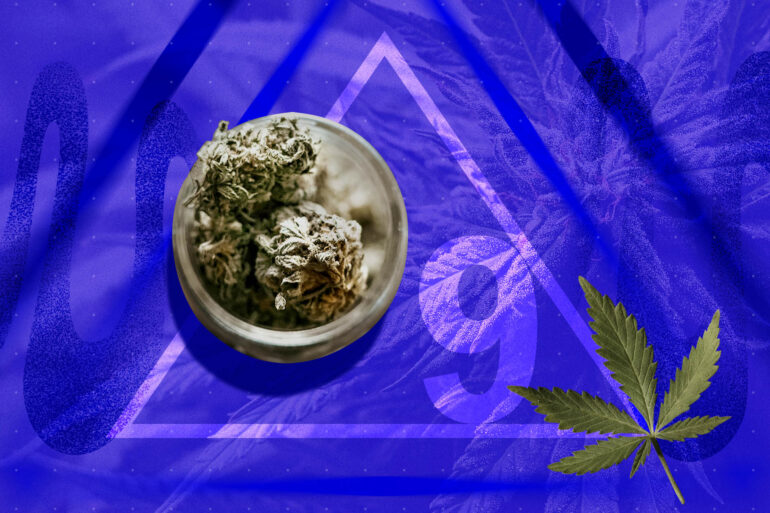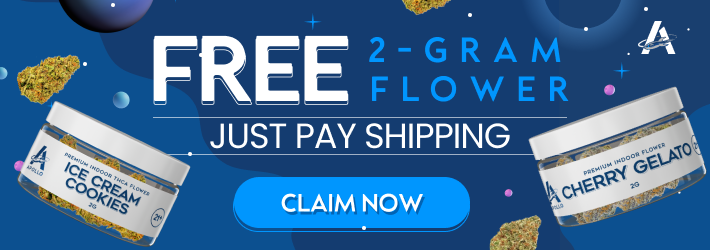THC is best known for both its medicinal and psychotropic effects. Nowadays, THC is recommended by healthcare professionals in a majority of states for conditions like chronic pain, nausea, cancer, PTSD, Alzheimer’s, and more.
Newcomers should be careful when dosing THC, as it correlates with psychoactive effects that can be intense.
The side effects of THC are dose-dependent and may include anxiety, paranoia, intoxication, short-term memory deficit, fast heart rate, and dry mouth. The potential link between cannabis use and psychotic disorders remains debated but merits caution.
What Is THC?
THC is the dominant psychoactive compound in Cannabis, out of almost 150 cannabinoids. Discovered in 1971 by the legendary Dr. Raphael Mechoulam, THC has been therapeutically used for millennia.
About 20 years later, in the 1990s, we learned that THC works primarily by activating CB1 and CB2 receptors. CB1 locations in the brain correlate with the psychotropic effects of THC, like increasing appetite, mood and euphoria, extinguishing fearful memories, and more. CB2 receptors influence our immune system and support neuronal health.
THC can be delivered by consuming cannabis products in myriad ways, each route with its pros and cons. Thankfully, neither cannabis smoking nor vaping is required to get the benefits of THC, and should be avoided in people with heart or lung conditions. Healthier alternatives like tinctures, edibles, topicals, and more are available in legal markets.
Medical Benefits
In addition to symptomatic relief of the conditions listed above, the strongest evidence behind therapeutic uses of THC is for:
- Chronic pain: The most commonly cited reason, especially neuropathic
- Nausea and vomiting: Particularly after chemotherapy (i.e. Dronabinol, Nabilone)
- Increasing appetite: Natural THC works, and pharmaceutical THC (e.g. Dronabinol) can also be prescribed
- Muscle spasms: In combination with CBD for MS-related spasticity. Nabiximols (1:1 CBD:THC) is approved in almost 30 other countries
New research is emerging on its potential for conditions like ADHD and substance use disorders. However, THC is liable to cause tolerance and dependence in a small subset of people, and so cannabis use disorder does exist. CBD may counter THC’s highs and reduce cannabis use.
Side Effects
People who are beginning their cannabis journey should be careful when it comes to THC. The most noticeable psychoactive features are impairment, euphoria, increased appetite, and intoxication. These side effects may become more intense as the dose increases, and could turn into dysphoria, paranoia, and anxiety.
Psychotropic side effects may be accompanied by physical effects like:
- Fast heart rate
- Dizziness upon standing
- Sedation or drowsiness
- Dry mouth and dry, red eyes
Will THC Get You High?
Yes, THC can get you high, and the duration of the high depends on the route of administration. THC impairment typically has a window of ~3 to 10 hours after use, with oral THC producing longer and stronger effects than inhaled forms. THC should not be given to children, pets, and pregnant or breastfeeding people.
Importantly, hemp is high in CBD and very low in THC, so it cannot deliver enough THC to get you high unless contaminated.
RELATED: CBD vs. THC: Benefits, Side Effects, and Legality
Conclusion
THC is a special compound that people most often associate with cannabis. There are many reasons to use THC, but it’s just one piece of the story of Cannabis.
References
- Barrales-Cureño, H. J., López-Valdez, L. G., Reyes, C., Cetina-Alcalá, V. M., Vasquez-García, I., Diaz-Lira, O. F., & Herrera-Cabrera, B. E. (2020). Chemical Characteristics, Therapeutic Uses, and Legal Aspects of the Cannabinoids of Cannabis sativa: A Review. Brazilian Archives of Biology and Technology, 63, e20190222. https://doi.org/10.1590/1678-4324-2020190222
- Belgers, V., Röttgering, J. G., Douw, L., Klein, M., Ket, J. C. F., van de Ven, P. M., Würdinger, T., van Linde, M. E., Niers, J. M., Weber, M., Olde Rikkert, M. G., Lopez-Sendon, J., Arrieta, O., Svendsen, K. B., Chagas, M. H. N., de Almeida, C. M. O., Kouwenhoven, M. C. M., & de Witt Hamer, P. C. (2023). Cannabinoids to Improve Health-Related Quality of Life in Patients with Neurological or Oncological Disease: A Meta-Analysis. Cannabis and Cannabinoid Research, 8(1), 41–55. https://doi.org/10.1089/can.2021.0187
- Bilbao, A., & Spanagel, R. (2022). Medical cannabinoids: A pharmacology-based systematic review and meta-analysis for all relevant medical indications. BMC Medicine, 20(1), 259. https://doi.org/10.1186/s12916-022-02459-1
- Dellazizzo, L., Potvin, S., Giguère, S., & Dumais, A. (2023). The Potential Paradoxical Neurocognitive Effects of Cannabis Use in Patients with Psychotic Disorders: A Critical Meta-Review of Meta-Analytical Evidence. Cannabis and Cannabinoid Research, 8(3), 464–475. https://doi.org/10.1089/can.2021.0163
- Ebbert, J. O., Scharf, E. L., & Hurt, R. T. (2018). Medical Cannabis. Mayo Clinic Proceedings, 93(12), 1842–1847. https://doi.org/10.1016/j.mayocp.2018.09.005
- Fernandes, J. A. B., Filev, R., & Fidalgo, T. M. (2023). Cannabinoids for Substance Use Disorder Treatment: What Does the Current Evidence Say? Cannabis and Cannabinoid Research, 8(5), 703–715. https://doi.org/10.1089/can.2023.0065
- Henshaw, F. R., Dewsbury, L. S., Lim, C. K., & Steiner, G. Z. (2021). The Effects of Cannabinoids on Pro- and Anti-Inflammatory Cytokines: A Systematic Review of In Vivo Studies. Cannabis and Cannabinoid Research, 6(3), 177–195. https://doi.org/10.1089/can.2020.0105
- Mansell, H., Quinn, D., Kelly, L. E., & Alcorn, J. (2022). Cannabis for the Treatment of Attention Deficit Hyperactivity Disorder: A Report of 3 Cases. Medical Cannabis and Cannabinoids, 5(1), 1–6. https://doi.org/10.1159/000521370
- American Cancer Society. Marijuana and Cancer | Cannabinoid Drugs. (2022, August 3). https://www.cancer.org/cancer/managing-cancer/treatment-types/complementary-and-integrative-medicine/marijuana-and-cancer.html
- McCartney, D., Suraev, A., & McGregor, I. S. (2023). The “Next Day” Effects of Cannabis Use: A Systematic Review. Cannabis and Cannabinoid Research, 8(1), 92–114. https://doi.org/10.1089/can.2022.0185
- National Academies of Sciences, E., Division, H. and M., Practice, B. on P. H. and P. H., & Agenda, C. on the H. E. of M. A. E. R. and R. (2017). The Health Effects of Cannabis and Cannabinoids: The Current State of Evidence and Recommendations for Research. National Academies Press (US). https://www.ncbi.nlm.nih.gov/books/NBK423845/
- Russo, E. B. (2011). Taming THC: Potential cannabis synergy and phytocannabinoid-terpenoid entourage effects. British Journal of Pharmacology, 163(7), 1344–1364. https://doi.org/10.1111/j.1476-5381.2011.01238.x
- Russo, E. B. (2016). Clinical Endocannabinoid Deficiency Reconsidered: Current Research Supports the Theory in Migraine, Fibromyalgia, Irritable Bowel, and Other Treatment-Resistant Syndromes. Cannabis and Cannabinoid Research, 1(1), 154–165. https://doi.org/10.1089/can.2016.0009
- Walsh, K. B., McKinney, A. E., & Holmes, A. E. (2021). Minor Cannabinoids: Biosynthesis, Molecular Pharmacology and Potential Therapeutic Uses. Frontiers in Pharmacology, 12. https://www.frontiersin.org/articles/10.3389/fphar.2021.777804

